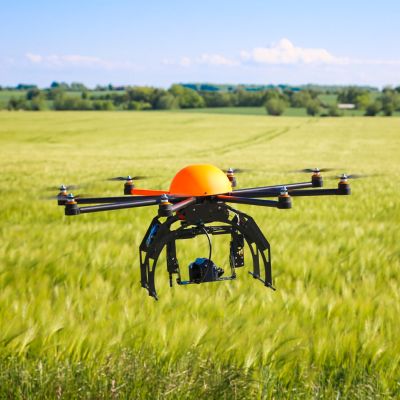This part-time course is primarily delivered online, with students coming together twice annually for week-long residentials at Cranfield. The course meets the requirements of the Soil Scientist Level 7 Apprenticeship Standard. Eligible organisations are able to use £21,000 of their Apprenticeship Levy towards the £23,282 fees. See Fees and Funding for more information. Employers – please complete our Expression of Interest form.
Overview
- Start dateNovember 2025
- DurationTwo years part-time - plus 3 months to complete EPA
- DeliveryTaught modules: 120 credits, Reflective portfolio project: 60 credits
- QualificationMSc
- Study typePart-time
- CampusCranfield campus/Online
Who is it for?
The course is suitable for:
- Soil scientists and consultants, who are keen to upskill their knowledge and understanding of soil monitoring and analysing soil conditions, as well as those who assist farmers in determining soil health and optimizing sustainable management strategies.
- Employees of organisations that offer guidance on earthworks, construction and demolition projects, or urban green infrastructure, who are keen to advance their expertise in assessing and mitigating the effects of such works on urban soils.
- Soil mappers and surveyors who use a combination of digital technology and traditional tools like soil pit digging to evaluate soil types for various stakeholders.
- Environmental consultants specialising in providing advice on sustainable materials, waste management, biodiversity, flood control, and ecosystem restoration.
- Government agencies and non-profit organisations that inform soil policy decisions and develop guidance documents.
- The apprenticeship route of this course is suitable for students based in the UK, those outside the UK are welcome to study the course but will need to apply for the Soil Science MSc.
Why this course?
The course will equip and upskill organisations with the knowledge, understanding, tools, practices, and resources to achieve optimal soil management across both rural and urban settings.
The course aims:
- To help students to critically evaluate soil properties and functions, and understand how soils interact with the wider environment to deliver critical ecosystem goods and services.
- To allow students to devise effective soil management plans that can integrate the principles of sustainable and resilient land management with the priorities of local and national policy.
- To provide students with a wide-ranging toolkit for effective decision-making across different land-use and management contexts, including GIS-based mapping, data analytical skills, field-based techniques, and laboratory analyses.
- To empower students to enhance their professional competencies and personal development in order to build the next generation of soil scientists ready to address the needs of internal and external stakeholders and tackle grand and complex challenges.
Informed by industry
This Apprenticeship has been co-designed with Arcadis, Askew Land and Soil, Atkins Limited, British Society of Soil Science, Cornwall College Group, ERS, Land Research Associates, Natural England, RSK ADAS, Tim O’Hare Associates, Wardell Armstrong, WPS Compliance Consultants, Defra, and Society for the Environment.
Course details
The course comprises 12 taught modules and a reflective portfolio project. It will be primarily delivered online from Cranfield University’s new state-of-the-art teaching studio which allows students to engage interactively within a virtual classroom. This will also enable wide and diverse participation across the UK. Modules are evenly spread throughout the two years and will primarily be delivered live on Tuesdays.
Four modules (two in Year 1 and two in Year 2) will include one-week Residentials at Cranfield, where field-based and laboratory-based skills can be best demonstrated. This will provide ideal opportunities throughout the course for the cohort to get to know each other, network with academics and industry representatives, and create enduring supportive alumni groups.
Throughout the course, you will also work on an individual reflective portfolio which will draw upon the knowledge, understanding, skills and behaviours that you accrue throughout the taught modules. This will provide an opportunity to demonstrate that you can apply the learning from the course in a practical real-world scenario.
Course delivery
Taught modules: 120 credits, Reflective portfolio project: 60 credits
Modules
Keeping our courses up-to-date and current requires constant innovation and change. The modules we offer reflect the needs of business and industry and the research interests of our staff and, as a result, may change or be withdrawn due to research developments, legislation changes or for a variety of other reasons. Changes may also be designed to improve the student learning experience or to respond to feedback from students, external examiners, accreditation bodies and industrial advisory panels.
To give you a taster, we have listed the compulsory and elective (where applicable) modules which are currently affiliated with this course. All modules are indicative only, and may be subject to change for your year of entry.
Course modules
Compulsory modules
All the modules in the following list need to be taken as part of this course.
Project Management and Portfolio
| Module Leader |
|
|---|---|
| Aim |
This module aims to empower learners in critically self-reflecting on their professional competency and personal development as soil scientists. By synthesizing and reinforcing the knowledge, skills, and behaviours acquired throughout the course, learners will compile a portfolio of work: they will design a new soil science field laboratory. This exercise will encourage the reinforcement and real-world application of learning from other modules within the course, to progressively foster a holistic understanding of soil science and its practical implications. The module will also include modular self-assessment of competency and personal development via guided reflection sessions, and practical workshops for portfolio development. By undertaking this module, learners will develop heightened self-awareness, an integrated understanding of soil science, effective communication skills, and overall professional growth. The module seeks to produce soil scientists capable of applying their knowledge in real-world scenarios, contributing to ongoing learning and development in their careers. |
| Syllabus |
Competency Building Sessions
Mindset behaviours of a soil scientist including:
Reflective portfolio will ask learners to simulate the development of a new (fictitious) soil science field laboratory including: (i) stakeholder mapping exercise (drawing on modules 2 and 3); (ii) shortlisting optimum locations for the laboratory based on variety of data (drawing on modules 2 and 4); (iii) surveying methodology to finalize location (drawing on modules 5, 6, 7, 11 and 12); (iv) identifying strategic activities of the field laboratory (drawing on modules 8, 9, and 10); and (v) a ‘soil scientist’ job description (drawing on ‘mindset behaviours’ earlier in this module).
|
| Intended learning outcomes |
On successful completion of this module you should be able to:
|
Introduction to Soils
| Module Leader |
|
|---|---|
| Aim |
To ensure that the use and management of soils is appropriate, effective, and sustainable, fundamental knowledge and understanding of soils is required first. The aim of this module is to introduce the fundamental science of soil systems. It will introduce what soils are and how they are formed, the basic physical, chemical, and biological properties that can be used to characterize soils, and the principal contributions that soils make to supporting the delivery of ecosystem goods and services across both rural and urban contexts. |
| Syllabus |
|
| Intended learning outcomes |
On successful completion of this module you should be able to:
|
Soil Policy
| Module Leader |
|
|---|---|
| Aim |
Soil is a non-renewable and essential resource necessary to maintain environmental and societal sustainability. Soil Policy plays a crucial role in ensuring sufficient protection and actions are undertaken within different sectors to ensure sustainable use and management of soils for the benefit of the environment, economy, and society. |
| Syllabus |
|
| Intended learning outcomes |
On successful completion of this module you should be able to:
|
Desk-based Soil Assessments and Basic Statistics
| Module Leader |
|
|---|---|
| Aim |
Soil scientists are expected to understand and monitor soil functions and assess how soil properties change over time in response to other environmental changes. A desk-based assessment is essential to collect and critically assess available soil data, to inform decisions or proposed approaches for future surveys. |
| Syllabus |
|
| Intended learning outcomes |
On successful completion of this module you should be able to:
|
Soil Surveying
| Module Leader |
|
|---|---|
| Aim |
A soil survey is an inventory of the properties of the soil (such as texture, structure, internal drainage, depth to water table, stoniness, density and contamination). It provides a detailed insight into the characteristics of a parcel of land and the distribution of soil resources across a site. A soil survey defines the quality of the resource and can reveal anomalies at an earlier stage in land development allowing better budgeting. In the construction industry a soil survey helps quantify groundwork requirements for storage, reuse or requirements for disposal. In an agricultural context a soil survey informs which crops the land will best support, whether irrigation or drainage will be require and likely number of workdays the land will support. Soil surveys can also support environmental projects helping to make informed decisions about land use and how to protect the soil and wider environment. An ability to be able to undertake and interpret soil surveys enables better use and protection of a valuable non-renewable resource. Therefore, the aim of this module is to develop the necessary skills to conduct soil surveys, plan a field-based sampling regime, and make use of secondary datasets available for reconnaissance / additional survey support, for anyone involved with soil related projects (agricultural, construction or environmental). |
| Syllabus |
Soil survey
Soil survey methodology
Soil Resource Plan (SRP)
Agricultural Land Classification (ALC)
Soil Management Plan
|
| Intended learning outcomes |
On successful completion of this module you should be able to:
|
Field-based Methods for Rural Soils
| Module Leader |
|
|---|---|
| Aim |
Field surveys and sampling programmes are essential for soil monitoring and assessment in the agricultural sector and in broader rural soil management. This includes a thorough understanding of how to classify soils, monitor soil nutrient levels and carbon stocks, and assess greenhouse gas fluxes. This module will equip learners with the knowledge and skills needed to conduct field soil measurements, hands-on experience in doing so, and an understanding of how soil conditions are influenced by landscape processes, management practices and climate. |
| Syllabus |
|
| Intended learning outcomes |
On successful completion of this module you should be able to:
|
Fundamental Laboratory Methods in Soil Science
| Module Leader |
|
|---|---|
| Aim |
Soil scientists are required to understand laboratory methodologies such that they can acquire, interpret, and critically evaluate laboratory data. This module aims to you teach basic laboratory methodologies, with an emphasis towards gaining a practical understanding of the methods. The module will also provide you with an understanding of data quality. This is required to understand the condition of soils, but also to monitor aspects of quality and health and ultimately to provide guidance and consultancy to stakeholders. |
| Syllabus |
|
| Intended learning outcomes |
On successful completion of this module you should be able to:
|
Soils - a Nexus
| Module Leader |
|
|---|---|
| Aim |
Soil properties and functioning are shaped by the interactions with the atmosphere, water, plants and animals (here termed the ‘soil nexus’). An understanding of these interactions is essential for informing soil- and broader land management. This module will build upon the Introduction to Soils module and take a systems-based approach to provide you with a strong knowledge base in the fundamental science underpinning these interactions and how they regulate soil functions. It will explore soil systems’ delivery of ecosystem goods and services and threats facing the ability of the soil nexus to deliver these, alongside how soil interactions with the broader environment can build resilience in soil systems. You will develop their ability to critically analyse factors affecting soil properties and processes using a systems perspective and holistic approach. |
| Syllabus |
|
| Intended learning outcomes |
On successful completion of this module you should be able to:
|
Soil Mapping, Modelling and GIS
| Module Leader |
|
|---|---|
| Aim |
Traditional soil surveys can be time and cost consuming and are subject to errors that cannot be quantified. Numerical modelling methods, coupled with GIS, can offer a rapid and cost-effective way of producing maps of soil classes and properties that can be evaluated in terms of their accuracy, and can inform traditional soil surveys. Generation of such maps must be underpinned with the capability of spatial data management within a GIS environment. Such skills can then be transferred to soil assessments to determine a soil’s contribution to natural capital and ecosystem services. |
| Syllabus |
|
| Intended learning outcomes |
On successful completion of this module you should be able to:
|
Advanced Data Analysis and Statistics
| Module Leader |
|
|---|---|
| Aim |
The aim of this module is to provide you with the fundamental knowledge and skills needed to conduct advanced data analysis and statistics in soil science. You will learn to assess data accuracy, precision, and reliability, considering bias and sampling designs. The R programming language will be introduced for statistical analysis of soils data. Specific topics include exploratory data analysis and long-term time series analysis to identify patterns and trends in soil properties. You will also learn to present analyses through tables, textual summaries, and effective visualisations. The module focuses on enhancing communication skills with the creation of storyboards, ensuring students can convey findings clearly.
|
| Syllabus |
|
| Intended learning outcomes |
On successful completion of this module you should be able to:
|
Field-based Methods for Urban Soils
| Module Leader |
|
|---|---|
| Aim |
Urban soils are a critical part of the landscape and deliver a great variety of services often distinct from other soils. This module will equip learners with the knowledge of the importance of soils in urban settings and equips them with skills to assess urban soils in the field, and how these soils relate to goods and services. |
| Syllabus |
|
| Intended learning outcomes |
On successful completion of this module you should be able to:
|
Advanced Laboratory Methods in Soil Science
| Module Leader |
|
|---|---|
| Aim |
Building on module 7, this module aims to teach you laboratory methodologies in advanced soil analysis, with an emphasis towards gaining a practical understanding of these methods. The module will develop your understanding about assessing data quality. This is required to understand the condition of soils, but also to monitor aspects of quality and health and ultimately to provide guidance and consultancy to stakeholders.
|
| Syllabus |
|
| Intended learning outcomes |
On successful completion of this module you should be able to:
|
Sustainable and Resilient Land Management
| Aim |
Land degradation adversely affects all 17 of the UN Sustainable Development Goals (SDGs). Soil policies and practices aim to protect and enhance our soil resources, so that they are resilient in delivering multiple ecosystem goods and services to society, delivering all three pillars of sustainability (economic, environmental, and social). The aim of this module is to define soil resilience and sustainability, and how these can be achieved by appropriate, cost-effective, and innovative land management practices that both control environmental damages (e.g. greenhouse gas emissions, pollution, contamination) and enhance soil natural capital (e.g. soil amendments, drainage). The module considers different land-use sectors (agriculture, horticulture, forestry, archaeology, construction, and natural habitats), set in the context of a rapidly changing environment
|
|---|---|
| Syllabus |
|
| Intended learning outcomes |
On successful completion of this module you should be able to:
|
Teaching team
You will be taught by industry-active research academics at Cranfield with an established track record, supported by visiting lecturers from industry.
The Course Director is Dr Daniel Evans and the Deputy Course Director is Dr Christopher McCloskey.
Accreditation
This apprenticeship aligns with British Society of Soil Science for technical membership. The apprenticeship will align with the requirements for membership with British Society of Soil Science. Those enrolling for the apprenticeship will be able to apply for Early Careers membership of the Society which will automatically change to technical membership upon demonstration of successful completion of the apprenticeship.
How to apply
Next steps
Our students do not always fit traditional academic or career paths. We consider this to be a positive aspect of diversity, not a hurdle. We are looking for a body of professional learners who have a wide range of experiences to share. If you are unsure of your suitability for our Apprenticeship programme, we are happy to review your details and give feedback before you make a formal application.
Questions?
For queries relating to…
- general information about the course, course modules etc. please email Daniel.L.Evans@cranfield.ac.uk.
- employer related enquiries, fees and funding, and the expression of interest/application process, please contact our Apprenticeships Team at apprenticeships@cranfield.ac.uk
Employers: please complete our Expression of Interest form
Prospective students: please ask your employer to submit an Expression of Interest form to indicate their willingness to sponsor you.
Applications for apprenticeship routes have to come via the Expression of Interest form. Apprenticeship applications received via the application button on the non-apprenticeship pages will not be processed.
Deadlines
Expression of interest deadline: 18 September 2025
Application deadline: 25 September 2025











